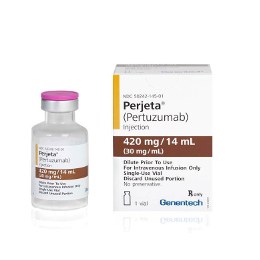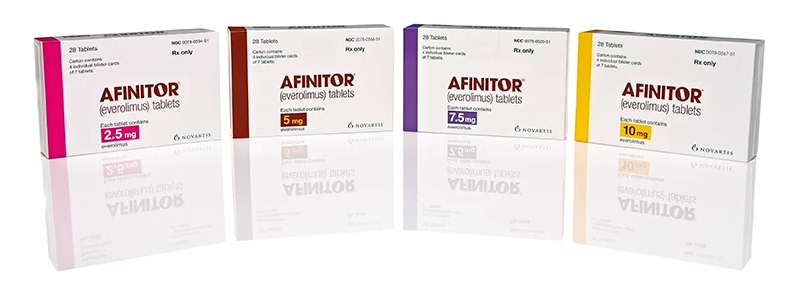Perjeta (Pertuzumab) vs Afinitor (everolimus)
Perjeta (Pertuzumab) vs Afinitor (everolimus)
Perjeta (pertuzumab) is a monoclonal antibody designed to target the HER2 receptor, which is overexpressed in some types of breast cancer, and is typically used in combination with other drugs like trastuzumab and chemotherapy for the treatment of HER2-positive breast cancer. Afinitor (everolimus), on the other hand, is an mTOR inhibitor that is used in various types of cancers, including hormone receptor-positive, HER2-negative breast cancer, and is often prescribed when certain other treatments have not worked or have stopped working. The choice between Perjeta and Afinitor would depend on the specific characteristics of the cancer, such as hormone receptor and HER2 status, as well as previous treatments and individual patient factors, making it crucial for a patient to discuss with their oncologist to determine the most appropriate treatment plan.
Difference between Perjeta and Afinitor
| Metric | Perjeta (Pertuzumab) | Afinitor (everolimus) |
|---|---|---|
| Generic name | Pertuzumab | Everolimus |
| Indications | HER2-positive breast cancer | Advanced hormone receptor-positive, HER2-negative breast cancer; renal cell carcinoma; neuroendocrine tumors; TSC-associated conditions such as SEGA and renal angiomyolipoma |
| Mechanism of action | HER2 dimerization inhibitor (monoclonal antibody) | mTOR inhibitor |
| Brand names | Perjeta | Afinitor, Zortress (USA), Certican (Europe) |
| Administrative route | Intravenous infusion | Oral |
| Side effects | Diarrhea, rash, nausea, fatigue, mucosal inflammation, among others | Mouth ulcers, infections, rash, fatigue, cough, diarrhea, among others |
| Contraindications | Hypersensitivity to pertuzumab or its excipients | Hypersensitivity to everolimus or other rapamycin derivatives, recent live vaccinations, concomitant strong CYP3A4 inducers |
| Drug class | Monoclonal antibody | mTOR inhibitor |
| Manufacturer | Genentech (Roche) | Novartis |
Efficacy
Efficacy of Perjeta (Pertuzumab) in Breast Cancer
Perjeta (Pertuzumab) is a monoclonal antibody that is used in the treatment of breast cancer. Specifically, it is approved for use in combination with trastuzumab and chemotherapy for the treatment of patients with HER2-positive metastatic breast cancer who have not received anti-HER2 therapy or chemotherapy for metastatic disease. The efficacy of Perjeta in this context has been demonstrated in several clinical trials. For instance, the CLEOPATRA study showed that patients receiving Pertuzumab in combination with trastuzumab and docetaxel had a significantly prolonged progression-free survival compared to those receiving trastuzumab and docetaxel alone. Overall survival was also improved in the Pertuzumab group.
Moreover, Pertuzumab is also used in the neoadjuvant setting (treatment given as a first step to shrink a tumor before the main treatment) for patients with HER2-positive, locally advanced, inflammatory, or early-stage breast cancer (either greater than 2 cm in diameter or node-positive). The NEOSPHERE and TRYPHAENA studies have shown that adding Pertuzumab to chemotherapy and trastuzumab can increase the rate of pathological complete response, which is an indicator of the effectiveness of the treatment.
Efficacy of Afinitor (Everolimus) in Breast Cancer
Afinitor (Everolimus) is an mTOR inhibitor utilized in the treatment of postmenopausal women with advanced hormone receptor-positive, HER2-negative breast cancer in combination with exemestane after failure of treatment with letrozole or anastrozole. The BOLERO-2 clinical trial provided evidence of Afinitor's efficacy, demonstrating that the addition of Everolimus to exemestane significantly extended progression-free survival compared to exemestane alone. This improvement in progression-free survival indicates that Everolimus can help to delay the growth or spread of the tumor in this patient population.
While both Perjeta and Afinitor have shown efficacy in the treatment of certain types of breast cancer, it is essential to note that their use is contingent upon specific cancer characteristics such as hormone receptor and HER2 status. The choice of treatment is personalized and based on the patient's individual disease profile, and both medications are generally used in combination with other treatments to maximize their efficacy. As with all medications, the use of Perjeta and Afinitor should be under the guidance of an oncologist who can evaluate the benefits and risks for each patient.
Regulatory Agency Approvals
Perjeta
-
European Medical Agency (EMA), European Union

-
Food and Drug Administration (FDA), USA

-
Health Canada

-
Therapeutic Goods Administration (TGA), Australia

-
Medsafe (NZ)

Afinitor
-
European Medical Agency (EMA), European Union

-
Food and Drug Administration (FDA), USA

-
Health Canada

-
Pharmaceuticals and Medical Devices Agency (PMDA), Japan

-
Therapeutic Goods Administration (TGA), Australia

Access Perjeta or Afinitor today
If Perjeta or Afinitor are not approved or available in your country (e.g. due to supply issues), you can access them via Everyone.org.
How it works

Make an enquiry
Choose the medicine you want to buy, answer a couple of questions, and upload your prescription to speed things up. We’ll get back to you within 24 hours.


Make an enquiry
Choose the medicine you want to buy, answer a couple of questions, and upload your prescription to speed things up. We’ll get back to you within 24 hours.


Breeze through the paperwork
We'll guide you through the required documents for importing unapproved medicine, ensuring you have all the necessary information.


Get a personalized quote
We’ll prepare a quote for you, including medicine costs and any shipping, administrative, or import fees that may apply.


Receive your medicine
Accept the quote and we’ll handle the rest - sourcing and safely delivering your medicine.

Some text on this page has been automatically generated. Speak to your physician before you start a new treatment or medication.
Let's talk
If you have any questions, call us or send us a message through WhatsApp or email:
Contact us




